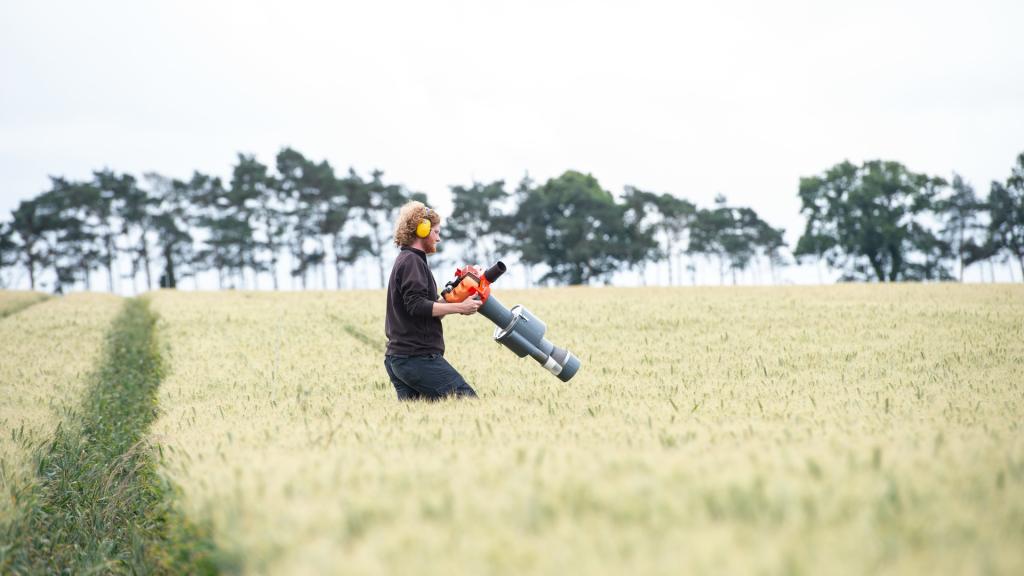The big picture: using wildflower strips for pest control
A new field study of arachnid hunting behaviour has shown that spiders forage for prey rich in specific nutrients, and their preferences depend on the individual spider’s species, life stage and sex. The results suggest that it may be possible to link spider predation to pest control in famers fields if the various arachnid species can be encouraged to selectively hunt troublesome insects.
In the study, adult spiders consumed more carbohydrate-rich and lipid-rich prey, whilst juvenile spiders consumed slightly more protein-rich prey. Other dietary differences between species were also identified. These prey preferences show that spiders may have evolved to vary their diet depending on their own nutritional requirements at certain stages in their life cycles.
Until recently this would have been a huge challenge, but now, using DNA sequencing and biochemical methods, we are able process large numbers of samples
“Many animals are thought to select food resources based on their nutritional content,” said study lead author Dr Jordan Cuff. “This has been studied before in the lab, but we wanted to find out if we could see the same effects in the field. Until recently this would have been a huge challenge, but now, using DNA sequencing and biochemical methods, we are able process large numbers of samples to identify both what spiders are eating and the nutritional value of the prey consumed.”
The study took place in fields in South Wales during a six-month period over the summer of 2018. First money spiders (Araneae: Linyphiidae) and wolf spiders (Araneae: Lycosidae) were collected by hand and then a suction sampler (essentially a large vacuum cleaner) was used to collect the invertebrate prey available to the spiders.

Using a DNA sequencing-based method called DNA metabarcoding, the species of prey that spiders ate were identified from fragments of DNA left in their guts and, by matching nutritional profiles to these data, it was possible to determine the nutrients spiders had been eating.
“These results suggest that spiders selectively forage for prey rich in protein, lipids and carbohydrates, but the balance between these shifts to fit the predator's specific needs. Diet regulation by spiders is thought to be adaptive and many previous studies have shown significant effects of dietary nutrient content on spider growth, reproduction and survival,” said Cuff.
Ultimately, an improved understanding of these kind of nutritional dynamics could be applied to improve biological pest control. Prey preferences could be exploited by changing field conditions and habitat structure to encourage predation of pests by providing nutritionally complementary prey.
Dr Jordan Cuff undertook the research as part of his PhD at Rothamsted and Cardiff University. He has since established the Foraging Ecology Research Group at Newcastle University.

Director of Communications and Engagement
Rothamsted Research is the longest-running agricultural research institute in the world. We work from gene to field with a proud history of ground-breaking
discoveries in areas as diverse as crop management, statistical interpretation and soil health. Our founders, in 1843, were the pioneers of modern
agriculture, and we are known for our imaginative science and our collaborative approach to developing innovative farm practice.
Through independent research, we make significant contributions to improving agri-food systems in the UK and internationally, with
economic impact estimated to exceed £3 bn in annual contribution to the UK economy. Our strength lies in our systems approach, which combines strategic research,
interdisciplinary teams and multiple partnerships.
Rothamsted is home to three unique National Bioscience Research Infrastructures which are open to researchers from all over the world:
The Long-Term Experiments,
Rothamsted Insect Survey and the
North Wyke Farm Platform.
We are strategically funded by the Biotechnology and Biological Sciences Research Council (BBSRC), with additional support from other national and
international funding streams, and from industry. We are also supported by the Lawes Agricultural Trust (LAT).
The Biotechnology and Biological Sciences Research Council is part of UK Research and Innovation, a non-departmental public body funded by a grant-in-aid
from the UK government.
BBSRC invests to push back the frontiers of biology and deliver a healthy, prosperous and sustainable future. Through our investments, we build and support a vibrant,
dynamic and inclusive community which delivers ground-breaking discoveries and develops bio-based solutions that contribute to tackling global challenges,
such as sustainable food production, climate change, and healthy ageing.
As part of UK Research and Innovation (UKRI), we not only play a pivotal role in fostering connections that enable the UK’s world-class research and innovation system
to flourish – we also have a responsibility to enable the creation of a research culture that is diverse, resilient, and engaged.
BBSRC proudly forges interdisciplinary collaborations where excellent bioscience has a fundamental role. We pioneer approaches that enhance the equality, diversity,
and inclusion of talent by investing in people, infrastructure, technologies, and partnerships on a global scale.
The Lawes Agricultural Trust, established in 1889 by Sir John Bennet Lawes, supports Rothamsted Research’s national and international agricultural science through the provision of land, facilities and funding. LAT, a charitable trust, owns the estates at Harpenden and Broom's Barn, including many of the buildings used by Rothamsted Research. LAT provides an annual research grant to the Director, accommodation for nearly 200 people, and support for fellowships for young scientists from developing countries. LAT also makes capital grants to help modernise facilities at Rothamsted, or invests in new buildings.